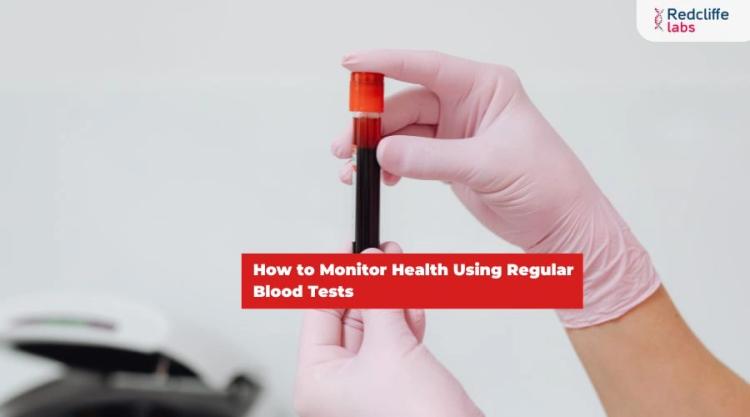All You Need to Know about the Prolactin Test

Medically Reviewed By
Dr. Ragiinii Sharma
Written By Meenakshi
on Jan 25, 2023
Last Edit Made By Meenakshi
on Jan 9, 2025

Hey there, are you curious about the hormone prolactin and the test that measures its levels in your body? Well, you've come to the right place! Prolactin is a hormone that plays a significant role in the reproductive system, especially for women, where it helps with milk production during breastfeeding and also helps regulate menstrual cycles.
But it's not just for women; it's important for men, too, as it helps with sperm production.
An abnormal prolactin level can indicate a pituitary gland disorder or tumor, which is why doctors may order a prolactin test. But don't worry; the test is simple and has nothing to be nervous about.
In this blog, we'll break down everything you need to know about the prolactin test - what it is, why it's done, how it's done, and what the results mean. So whether you're a healthcare professional or just someone who wants to learn more, this guide is for you.
What Is a Prolactin Test?
Prolactin is a hormone produced by the pituitary gland that plays a crucial role in lactation and reproductive health. It is primarily responsible for stimulating milk production in women after childbirth. However, it also plays a role in the menstrual cycle and fertility in both men and women.
The prolactin blood test measures the amount of prolactin in the blood and is used to diagnose and monitor conditions such as pituitary tumors, infertility, and hormonal imbalances.
High prolactin levels can indicate a pituitary tumor or other medical conditions, while low levels can indicate a pituitary gland problem or hypothalamic disorder.
Symptoms That May Require Prolactin Test
Symptoms that may indicate a need for a prolactin test in both men and women include:
- Infertility or difficulty becoming pregnant
- Vision problems, such as double vision or loss of peripheral vision
- Headaches, which can be severe and located in the front or back of the head
- Changes in menstrual cycles or lactation in women
- Fatigue or weakness
- Depression or anxiety
- Galactorrhea (spontaneous milk production or leakage of milk from the breast) in women
- Erectile dysfunction
- Abnormal growth of body and facial hair in women
It's essential to consider that some people with high prolactin levels may not have any symptoms at all. In some cases, the test may be done as part of a routine examination or as an evaluation for other medical conditions.
Also, people with prolactinoma (a pituitary tumor that produces high levels of the hormone prolactin) may not have any symptoms. It might be possible that the tumor may be discovered during a routine examination or while being evaluated for other medical conditions.
If you suspect you have a prolactinoma or any of these symptoms, it's best to consult your doctor as soon as possible.
Why Is the Prolactin Test Helpful?
In women, the prolactin test is used to help diagnose and monitor conditions such as:
- Polycystic ovary syndrome (PCOS): High levels of prolactin can disrupt ovulation and cause irregular periods.
- Infertility: Prolactin can interfere with ovulation, making it difficult for a woman to become pregnant.
- Lactation and galactorrhea (spontaneous milk production or milk leakage from the breast)
In men, the prolactin test is used to help evaluate the cause of:
- Impotence: High levels of prolactin can reduce libido and cause erectile dysfunction.
- Infertility: Prolactin can interfere with sperm production, reducing sperm count and quality.
- Prolactinomas (a type of pituitary tumor) can cause headaches, vision problems, and changes in menstrual cycles or impotence.
How Is a Prolactin Test Done?
A prolactin test is a simple blood test, a healthcare provider will take a blood sample from a vein in the arm, and the sample will then be sent to a laboratory for analysis.
It is important to note that certain medications, such as antidepressants and hormone replacement therapy, can affect prolactin levels. Be sure to inform your healthcare provider of the medications you are currently taking before the test.
What are the Possible Risks of the Prolactin Test?
The prolactin blood test is generally considered safe. There is minimal risk of complications, such as -
- Bleeding or infection, from having blood drawn.
- Some people may experience slight discomfort or pain at the puncture site.
- In rare cases, a hematoma (a bruise) may occur at the puncture site.
- Some medications and anti-nausea drugs may affect the test results.
It's always best to consult your doctor if you have any concerns or questions about the test and the potential risks.
What do the Results Mean?
The results of a prolactin test will indicate the level of prolactin in the blood. Normal prolactin levels vary depending on a person's age and sex.
In non-pregnant women, normal prolactin levels range from 4-23 ng/mL.
Normal prolactin levels are typically lower in men, between 2-18 ng/mL.
If the prolactin level is higher than normal, it can indicate a pituitary tumor or other medical conditions. If the level is lower than normal, it can indicate a pituitary gland problem or hypothalamic disorder.
| Non-Pregnant Women | < 25 ng/mL |
| Pregnant Women | 34 to 386 ng/mL |
| Men | < 15 ng/mL |
Keep in mind that a prolactin test's results should be interpreted in conjunction with a person's symptoms and medical history. A healthcare provider will use the results to make a diagnosis and develop an appropriate treatment plan.
Takeaway
To summarize, a prolactin test is an essential diagnostic tool to measure the levels of prolactin in the blood, which plays a crucial role in regulating milk production. High levels of prolactin in the blood, known as hyperprolactinemia, can cause various symptoms.
But don't worry. Getting a prolactin test is easy and stress-free! And when it comes to finding the best diagnostic lab in India, look no further than Redcliffe Labs. Trusted by over 50,000 doctors and serving over 5 million happy customers, you can trust that your results will be accurate and reliable.
So don't wait any longer. Schedule your prolactin test with Redcliffe Labs today and take the first step toward understanding your health. And remember, early detection and treatment can make all the difference!
Leave a comment
3 Comments
naidu
Jun 29, 2024 at 8:14 AM.
141.69 value women treatment?
MyHealth Team
Jun 30, 2024 at 12:27 PM.
Hello! A prolactin level of 41.69 ng/mL is elevated and may require further evaluation. Elevated prolactin can be caused by various factors, including medications, pituitary gland issues, or other health conditions. Treatment depends on the underlying cause and may involve medication or other interventions. It’s important to consult with your healthcare provider to determine the appropriate treatment plan based on your specific situation. Take care!
Evelyn
Apr 26, 2024 at 3:19 PM.
Is my prolactin level 31.6 ng/ml normal?
Myhealth Team
Apr 26, 2024 at 5:50 PM.
Hi,
A prolactin level of 31.6 ng/mL is slightly above the normal range for non-pregnant women. Consulting a healthcare provider for personalized guidance is advisable.Thankyou
Sue
Nov 18, 2023 at 9:00 PM.
Is my prolactin level of 6.4 normal?
Myhealth Team
Nov 20, 2023 at 12:29 PM.
Prolactin level 6.4 ng/mL is usually normal. Consult your doctor for personalized advice.



